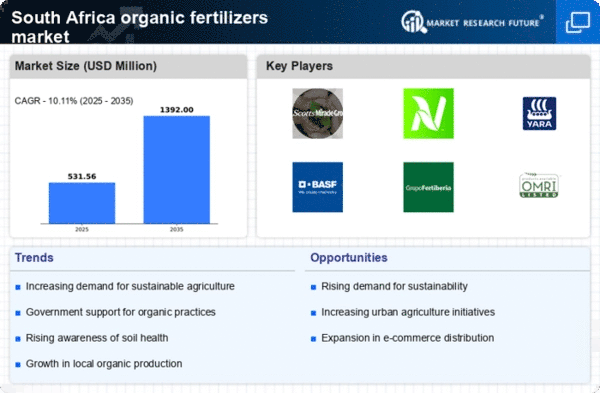Rising Food Security Concerns
Food security remains a pressing issue in South Africa, prompting a shift towards more sustainable agricultural practices. The organic fertilizers market is benefiting from this trend, as organic fertilizers are known to improve soil fertility and crop resilience. With an increasing population and limited arable land, the demand for efficient farming solutions is paramount. Organic fertilizers can enhance crop yields while minimizing environmental degradation, making them an attractive option for farmers. Recent statistics indicate that the organic fertilizers market could see a growth rate of around 7% annually as farmers seek to address food security challenges. This focus on sustainable practices not only supports local food production but also aligns with global efforts to promote food security, thereby driving the organic fertilizers market forward.
Support from Agricultural Cooperatives
Agricultural cooperatives in South Africa are playing a crucial role in promoting the use of organic fertilizers. These cooperatives provide farmers with access to resources, education, and financial support, facilitating the transition to organic farming practices. By offering training programs and workshops, cooperatives are helping farmers understand the benefits of organic fertilizers, which can lead to improved soil health and crop productivity. The organic fertilizers market is expected to benefit from this support, as more farmers are encouraged to adopt organic practices. Recent data suggests that the involvement of cooperatives could increase the adoption rate of organic fertilizers by up to 10% in the coming years. This collaborative approach not only enhances the organic fertilizers market but also strengthens the agricultural community as a whole.
Regulatory Incentives for Organic Farming
The South African government is increasingly implementing regulatory incentives to promote organic farming, which is positively influencing the organic fertilizers market. These incentives may include subsidies, tax breaks, and grants for farmers who adopt organic practices. Such measures are designed to encourage the transition from conventional to organic farming, thereby enhancing the overall sustainability of the agricultural sector. As a result, the organic fertilizers market is likely to experience growth, with projections indicating an increase of around 5% in market size over the next few years. The regulatory framework not only supports farmers financially but also aligns with broader environmental goals, making organic fertilizers a more viable option for sustainable agriculture in South Africa.
Consumer Preference for Chemical-Free Products
In South Africa, there is a notable shift in consumer preferences towards chemical-free and organic products. This trend is significantly impacting the organic fertilizers market, as consumers increasingly demand food that is free from synthetic chemicals. The perception that organic produce is healthier and safer is driving farmers to adopt organic fertilizers to meet market expectations. As a result, the organic fertilizers market is projected to grow by approximately 6% over the next few years. This consumer-driven demand encourages farmers to transition from conventional fertilizers to organic alternatives, thereby fostering a more sustainable agricultural landscape. The alignment of consumer preferences with organic farming practices is likely to further stimulate growth in the organic fertilizers market.
Increasing Awareness of Sustainable Agriculture
The organic fertilizers market in South Africa is experiencing growth due to a rising awareness of sustainable agricultural practices. Farmers and consumers alike are becoming more conscious of the environmental impact of conventional farming methods. This shift in mindset is leading to a greater demand for organic fertilizers, which are perceived as a more eco-friendly alternative. According to recent data, the organic fertilizers market is projected to grow at a CAGR of approximately 8% over the next five years. This trend indicates a significant shift towards sustainability, as more agricultural stakeholders recognize the benefits of organic inputs in enhancing soil health and crop yield. As awareness continues to spread, the organic fertilizers market is likely to expand, driven by both consumer preferences and regulatory pressures for sustainable farming practices.

















